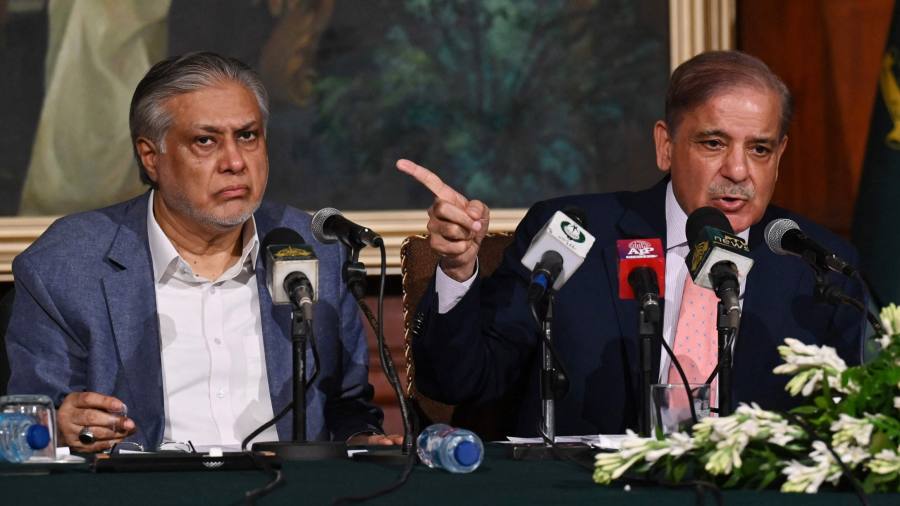Receive free Pakistan’s economy updates
We’ll send you a myFT Daily Digest email rounding up the latest Pakistan’s economy news every morning.
Pakistan’s prime minister Shehbaz Sharif has vowed to turn round the country’s crisis-hit economy as he faces hotly contested elections this year, after the government secured a crucial $3bn IMF rescue financing deal to avert the threat of default.
Pakistan and the IMF on Friday reached a preliminary agreement for a nine-month, short-term loan package after months of tense negotiations, helping avert an imminent default after the country’s foreign reserves fell precariously low. The IMF’s board is expected to approve the deal by the middle of this month.
Sharif hailed the deal, which came after Islamabad agreed a package of painful economic reforms, calling it “a much-needed breather”.
While the agreement “will help the country achieve economic stability, the nations are not built through loans”, he added. “I pray for this new programme to be the last one.”
Ishaq Dar, the finance minister, said on Friday: “We have stopped the decline, and now we have to turn to growth.”
Pakistan’s stocks surged the most in three years following the deal, with the benchmark KSE 100 index jumping almost 6 per cent on Monday morning, triggering an hourlong trading halt in Karachi.
The agreement also delivered a boost to Pakistan’s sovereign bonds, which have rallied sharply over the past week on hopes of a rescue. One dollar bond maturing in April 2024 — which had traded for as little as $0.42 on the dollar this year — climbed half a cent in early trading on Monday to just over $0.72.
Sharif said the IMF deal would strengthen his government’s hand against arch-rival Imran Khan, a former cricketer and prime minister who was ousted by parliament last year but is widely seen as the most popular candidate in national polls due by October.
Analysts warned that the bailout was only a short-term solution to Pakistan’s economic crisis, one of the worst in its history. Economists estimate the government owes about $25bn in debt repayments in the financial year that starts this month, meaning Sharif’s government must raise billions more from lenders such as China and Saudi Arabia.
It also needs to rein in inflation, which has soared to 38 per cent, exacerbating poverty, while the shortage of dollars has left businesses struggling to operate and created severe shortages of imports. Pakistan’s foreign reserves of $3.5bn are less than enough for one month’s worth of imports.
“The presence of the IMF gives confidence to the private sector that their government will generally pursue a prudent fiscal and monetary policy,” said Abid Hasan, a former World Bank adviser.
But he noted that successive governments in Islamabad have consistently failed to implement IMF-backed reforms needed to end boom-and-bust cycles that have plagued the country’s economy. The deal announced last week is the country’s 23rd with the fund.
“Pakistan’s future can only be determined by Pakistan,” Hasan said.
Pressure to break with the package of IMF-mandated reforms could also mount as elections approach. The commitments include unpopular measures such as cutting subsidies on energy and raising taxes in an effort to create a budget surplus. The government estimates that about half of budget spending for the financial year will go towards debt servicing, leaving comparatively little left.
“In the past, Pakistan has often reneged on a deal once the acute phase of the crisis has passed. The danger is that history repeats itself,” analysts at Capital Economics wrote in a note to clients. “Even if Prime Minister Shehbaz Sharif is committed to a deal, he could be out of office before the end of the year.”
The IMF programme also provides little immediate reprieve to businesses. Many have been hard hit by austerity measures as well as import and currency controls put in place to try to stem the drop in foreign reserves.
The Overseas Investors Chamber of Commerce and Industry said in a statement that the IMF deal would “remove the perpetual uncertainty in the economic landscape” but warned that investor faith in Pakistan had been shaken and the government needed to take “many confidence-building measures to kick start the stalled economic activities”.
Shahid Sattar, secretary-general of the All Pakistan Textile Manufacturers Association, said import shortages should ease as IMF dollars flowed back into financial markets.
But he added that the industry would continue to struggle with cripplingly high costs. About 40 per cent of the textile sector “is currently closed due to non-continuation of competitive energy tariffs and supply constraints”, he said, adding that the sector had already cut about 7mn jobs, or 20 per cent of its workforce.
Before the IMF deal, the economic crisis had become so severe that some multinationals announced they were leaving Pakistan altogether. In June, Shell said it would sell its stake in its local unit, while Virgin Atlantic this year announced that it was ceasing operations in the country.
Sheikh Ehsan Elahi, who runs football manufacturer Atlas Sports in Sialkot, a city famed for producing sporting goods for top international brands, said “rising cost of electricity and higher taxes” had led to a sharp slowdown. “We are no more competitive in the international market,” he said.
Additional reporting by Hudson Lockett in Hong Kong
Read the full article here




